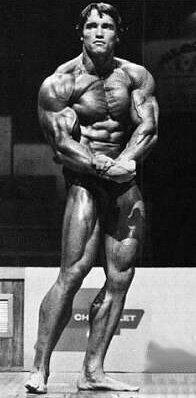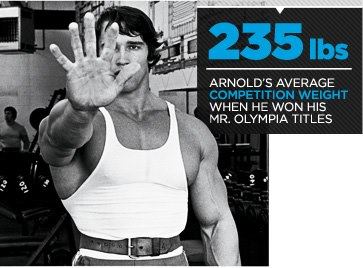Is BMI really BS?
Replies
-
I do not compete, no. I have several friends who do and have gleaned information from them as well as hours and hours of reasearch and trial and error on my own. I have consistently focused on developing muscle while shedding fat since August 2012.
Well, you've apparently managed to achieve a higher relative muscle mass than Iris Kyle (8x Ms Olympia), so that's.. something.
Yes. Funny how most of the people in this thread who are arguing are sporting higher relative masses than your typical competitor and Olympian.
Snowflakes are falling.1 -
BMI is lame because if you have a lot of muscle, like my boyfriend, you could be classified as 'obese' when you're really in shape. It's ridiculous! If you can, figure out your bodyfat percentage. Otherwise, just see how you feel! I honestly think BMI is only a good measure for people who are at a dangerous weight and need to get down to 'healthy' that way but for someone in a healthy range BMI isn't a great measure of health.0
-
I do not compete, no. I have several friends who do and have gleaned information from them as well as hours and hours of reasearch and trial and error on my own. I have consistently focused on developing muscle while shedding fat since August 2012.
Well, you've apparently managed to achieve a higher relative muscle mass than Iris Kyle (8x Ms Olympia), so that's.. something.
Yes. Funny how most of the people in this thread who are arguing are sporting higher relative masses than your typical competitor and Olympian.
Snowflakes are falling.
I guess I am more naive than I thought was...I truly believe what she said...LOL
now I decide not to say anything every time when I see a snowflake.0 -
I am posting as an outlier from the other end of the BMI scale. I am a little under 5'3", with a small frame (narrow shoulders, tiny wrists, little feet). My BMI is currently just under the "healthy" range at 18.2. I consider myself to be healthy and active. I don't think people would look at me and find me shockingly thin. My body fat percentage is around 19-20% and I've still got some squishy parts.
I know a while back, some researchers came up with a different BMI calculation that took into account the fact that many shorter people have smaller frames and taller people tend to be broader.
http://www.telegraph.co.uk/health/healthnews/9816596/Interactive-calculator-do-you-win-or-lose-with-the-new-BMI.html
I know using this calculator, my BMI is back up in the healthy range. On the other hand, it also increases the maximum weights for taller people.0 -
That's what's hilarious here. So far there have been almost no true outliers. Just people who are already on the higher end of the "healthy" BMI range, or are just a bit above and, when leaned down, would fall right in line with the "healthy" BMI.
There seems to be an agenda here against those that are overweight on the BMI chart yet refuse to accept they are fat
Too many are saying that overweight people are looking for an excuse to stay fat -maybe so, and I would agree with you on that; however that's got little to do with BMI
You want a true 'outier'? look no further
I am not an athlete, not a bodybuilder, don't look like a running back or Christiano Ronaldo, would consider myself as pretty normal (ok I'm below average height but not freakishly I hope!)
I was:
165lbs
23% BF
BMI = 27.2
= Overweight (and looked and felt it)
Last year
160lbs
16% BF
BMI = 26.3
= Overweight according to BMI - didn't look it, didn't feel it, was told I wasn't overweight
I lost some weight, gained a little muscle - my BMI changed very little.
Mine was just a small transformation from being fat and having no muscle to being not fat and having a little muscle
The BMI charts said my transformation went from being overweight.... to being overweight
http://www.myfitnesspal.com/photos/view/18401123
Just curious--do you know what bodyfat % your wife is? She looks similar to me, and I have wondered, but have not been able to test for bodyfat, except for my scales which are probably not especially accurate!0 -
Agree with Iwishyouwell.
And I agree too
Edited ti add: that until fat % are the measure used to determine if a person is fat, obese, or overweight, then BMI is practically the only tool available.0 -
BMI is not completely useless. Its probably meaningful for 8 people out of 10 - but it is not the whole story. You should combine with body fat percentage to get a good picture. If your body fat pct is in a good range, then your BMI is not really relevant.
People with high muscle/low fat can end up with a BMI that is thought of as overweight, when they are not. As far as I can see from the OP - looking good!0 -
So since I am also overweight according to BMI but nothing else, what magical and glorious health benefits will I accrue once I drop those last 3 pounds and reach a healthy BMI? What makes 167lbs an unhealthy weight for me but at 164lbs I am suddenly a healthy weight? And if I decide to bulk towards the end of the year and again go above 164lbs, which I will, do I suddenly become unhealthy again? That cut off point for me is downright silly. Sure I can get to a healthy BMI, but there's absolutely no reason I need to, I'm already healthy, and I don't give two farts about how "lean or ripped" I am.My profile pic/ avatar pic are from about 2 months ago (I weighed 233 lbs in those) so as you can see in those photos I am not fat.
You're not fat.
You are, however, overweight.
Over the long run, that's not healthy, either.0 -
I though you might find this useful.

The National Institutes of Heath did a study called: Accuracy of Body Mass Index to Diagnose Obesity In the US Adult Population
http://www.ncbi.nlm.nih.gov/pmc/articles/PMC2877506/
I'm sorry, but to me, this data speaks for itself, the r-squared values are laughable, BMI has almost NO predictive value in establishing how fat you are, and there are a whole hell of a lot of supposedly non existent outliers, on ALL sides of the correlation line. It doesn't tell you how healthy you are, it doesn't tell you how fat you are, all it tells you is how your height and weight compare to everybody else, so what good is it?
I don't think it is as bad as you think. It would be nice to show 2 other trend lines above and below the average that are 2 standard deviations from the mean. I bet you would then see where the outliers are... the trend is there and can be noticed, but with a lot of variation, so the lines would be further from the mean, but it is still not that bad of an indicator for the majority of the population
That's not how scatter plots work - the r-squared value indicates the data's predictive power. An r-square of 0.7 is considered a weak correlation, and only a fool would attempt to make predictions with an r-square below a 0.5. At best the plots show that NEWSFLASH! weight is correlated with height... really? Tall people generally weigh more than short people? Who'da thunk it?
Seriously, my jaw dropped when I saw those graphs, worthless metric is worthless, which is why I can't even go along with the OK for most argument any more.0 -
Okay, but how am I supposed to know what to follow? My waist to hip ratio is excellent and my waist to height ratio implies I am too thin. So with all the "science" conflicting itself what now?
"Science" is a constant struggle to determine more knowledge. Yes, science changes its statements as it gains more understanding. Thus, what was healthy to eat when I was a child (e.g. liver) may not be healthy to eat now because we know more. As we come to know more about the complexity of the link, if any, between dietary cholesterol and serum cholesterol, who knows? Liver may once again become a wonder food. So, the most important thing to do is be both informed and open to new information to adjust your actions accordingly.
Any of the numbers we use, BMI, TDEE, even calories, are estimates and are useful "more or less." They do work well in the extremes. My BMI is very high. I also weigh twice what a healthy weight is for someone my height. I am sedentary, flabby, and float high in the water. Do I need a measure of body fat percentage to convince me I need to shape up? No.
Each of us is different. We have different builds and different genetics. A gross calculation like BMI is not going to tell you exactly what is the exactly perfect weight for you. You need to determine that with the help of information.0 -
I though you might find this useful.

The National Institutes of Heath did a study called: Accuracy of Body Mass Index to Diagnose Obesity In the US Adult Population
http://www.ncbi.nlm.nih.gov/pmc/articles/PMC2877506/
I'm sorry, but to me, this data speaks for itself, the r-squared values are laughable, BMI has almost NO predictive value in establishing how fat you are, and there are a whole hell of a lot of supposedly non existent outliers, on ALL sides of the correlation line. It doesn't tell you how healthy you are, it doesn't tell you how fat you are, all it tells you is how your height and weight compare to everybody else, so what good is it?
I don't think it is as bad as you think. It would be nice to show 2 other trend lines above and below the average that are 2 standard deviations from the mean. I bet you would then see where the outliers are... the trend is there and can be noticed, but with a lot of variation, so the lines would be further from the mean, but it is still not that bad of an indicator for the majority of the population
That's not how scatter plots work - the r-squared value indicates the data's predictive power. An r-square of 0.7 is considered a weak correlation, and only a fool would attempt to make predictions with an r-square below a 0.5. At best the plots show that NEWSFLASH! weight is correlated with height... really? Tall people generally weigh more than short people? Who'da thunk it?
Seriously, my jaw dropped when I saw those graphs, worthless metric is worthless, which is why I can't even go along with the OK for most argument any more.
The major problem with BMI in this study is it under-detected obesity. The major problem people have with BMI in this thread is people believe it over-detects obesity. Basically, there are a lot of obese people who aren't 30+ BMI.2 -
I though you might find this useful.

The National Institutes of Heath did a study called: Accuracy of Body Mass Index to Diagnose Obesity In the US Adult Population
http://www.ncbi.nlm.nih.gov/pmc/articles/PMC2877506/
I'm sorry, but to me, this data speaks for itself, the r-squared values are laughable, BMI has almost NO predictive value in establishing how fat you are, and there are a whole hell of a lot of supposedly non existent outliers, on ALL sides of the correlation line. It doesn't tell you how healthy you are, it doesn't tell you how fat you are, all it tells you is how your height and weight compare to everybody else, so what good is it?
I don't think it is as bad as you think. It would be nice to show 2 other trend lines above and below the average that are 2 standard deviations from the mean. I bet you would then see where the outliers are... the trend is there and can be noticed, but with a lot of variation, so the lines would be further from the mean, but it is still not that bad of an indicator for the majority of the population
That's not how scatter plots work - the r-squared value indicates the data's predictive power. An r-square of 0.7 is considered a weak correlation, and only a fool would attempt to make predictions with an r-square below a 0.5. At best the plots show that NEWSFLASH! weight is correlated with height... really? Tall people generally weigh more than short people? Who'da thunk it?
Seriously, my jaw dropped when I saw those graphs, worthless metric is worthless, which is why I can't even go along with the OK for most argument any more.
The major problem with BMI in this study is it under-detected obesity. The major problem people have with BMI in this thread is people believe it over-detects obesity. Basically, there are a lot of obese people who aren't 30+ BMI.
I agree and said that earlier, doesn't change the fact that for indicating obesity, it's virtually worthless, so again, what IS it good for?0 -
I agree and said that earlier, doesn't change the fact that for indicating obesity, it's virtually worthless, so again, what IS it good for?
If you're BMI obese, you're very likely to actually be body fat obese. So that's what it's good for.0 -
this guy is considered obese based on BMI

6'1" 235lbs 0
0 -
I agree and said that earlier, doesn't change the fact that for indicating obesity, it's virtually worthless, so again, what IS it good for?
If you're BMI obese, you're very likely to actually be body fat obese. So that's what it's good for.
But it doesn't capture a whole slew of people who are actually obese, but will never know it because BMI says they're healthy, and skews drastically in the other direction for women as you approach healthy BMI. And as another poster has already pointed out, if you classify as obese on both BF and BMI, chances are you already know you have a weight issue and probably don't need BMI to tell you that.0 -
If you're under 6' tall, you're very unlikely to be drafted in the NBA.

NAH MAN clearly height is irrelevant.0 -
I agree and said that earlier, doesn't change the fact that for indicating obesity, it's virtually worthless, so again, what IS it good for?
If you're BMI obese, you're very likely to actually be body fat obese. So that's what it's good for.
But it doesn't capture a whole slew of people who are actually obese, but will never know it because BMI says they're healthy, and skews drastically in the other direction for women as you approach healthy BMI. And as another poster has already pointed out, if you classify as obese on both BF and BMI, chances are you already know you have a weight issue and probably don't need BMI to tell you that.
So doctors can take a quick measurement and point to that. So quick measurements can be used in statistics. Works a lot better than "looks fat".0 -
I agree and said that earlier, doesn't change the fact that for indicating obesity, it's virtually worthless, so again, what IS it good for?
If you're BMI obese, you're very likely to actually be body fat obese. So that's what it's good for.
But it doesn't capture a whole slew of people who are actually obese, but will never know it because BMI says they're healthy, and skews drastically in the other direction for women as you approach healthy BMI. And as another poster has already pointed out, if you classify as obese on both BF and BMI, chances are you already know you have a weight issue and probably don't need BMI to tell you that.
umm....unless they were looking at the wrong range of BMI...real obese with a healthy BMI is almost unlikely. The other way around (higher BMI but healthy muscle/fat ratio) is possible, which a lot of posters were trying to convince the others with their outlier examples...0 -
For studies of the general population BMI is a useful tool as all you need are everyone's weight and height, easy measures to obtain.
For an individual, it could potentially be very inaccurate.
This!
BMI is intended for use in population statistics. It is not really meant to be used for individual health decisions. When I was 16 I was about 155-160lb and very active in many sports and I was about a size 10-12. I am also about 5'6". My doctor actually showed me the BMI chart and said I had to weigh 145lb. My Mom (thankfully) told me she was full of it! 6 years later I got down to 150lb when I was sick and I looked really sick, not healthy. You are the final judge of how you look/feel. Don't put too much emphasis on the number the BMI chart gives you, it was not meant for that purpose.0 -
I agree and said that earlier, doesn't change the fact that for indicating obesity, it's virtually worthless, so again, what IS it good for?
If you're BMI obese, you're very likely to actually be body fat obese. So that's what it's good for.
But it doesn't capture a whole slew of people who are actually obese, but will never know it because BMI says they're healthy, and skews drastically in the other direction for women as you approach healthy BMI. And as another poster has already pointed out, if you classify as obese on both BF and BMI, chances are you already know you have a weight issue and probably don't need BMI to tell you that.
So doctors can take a quick measurement and point to that. So quick measurements can be used in statistics. Works a lot better than "looks fat".
Used as a general tool for population statistics, fine, but those r-squared values clearly indicate that for the individual, using BMI as a predictive measurement for how much fat they are carrying is useless. Which means it's also useless for the doctor because it doesn't actually tell the doctor anything about the health of their patient, it just tells them how tall they are and how much they weigh.0
Categories
- All Categories
- 1.4M Health, Wellness and Goals
- 391.3K Introduce Yourself
- 43.5K Getting Started
- 259.7K Health and Weight Loss
- 175.6K Food and Nutrition
- 47.3K Recipes
- 232.3K Fitness and Exercise
- 388 Sleep, Mindfulness and Overall Wellness
- 6.4K Goal: Maintaining Weight
- 8.5K Goal: Gaining Weight and Body Building
- 152.7K Motivation and Support
- 7.8K Challenges
- 1.3K Debate Club
- 96.4K Chit-Chat
- 2.5K Fun and Games
- 3.2K MyFitnessPal Information
- 22 News and Announcements
- 910 Feature Suggestions and Ideas
- 2.2K MyFitnessPal Tech Support Questions










